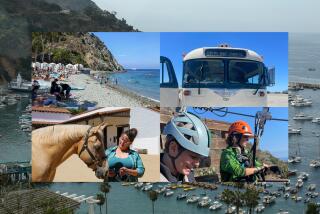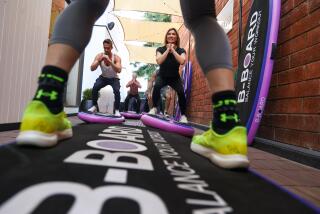Hands Across the Water : Mike Rogers Fights Cancer by Paddling --From Catalina to Manhattan Beach
- Share via
NEWPORT BEACH — Mike Rogers is mentally and physically preparing for the Catalina Classic, an arduous paddleboard race that will test his spirit and endurance.
He knows that on Aug. 25, the muscles in his neck will begin to tighten and lose their flexibility, becoming little centers of pain. The pain will spread throughout his middle and upper back.
He will put himself in a trance, playing mind games to escape the hurt. But he knows that eventually the pain will subside.
The cancer patients that Rogers hopes to help by raising money must battle such pain every day, pain that won’t go away in eight hours. That thought gives Rogers the strength to keep going.
For about 40 other contestants, the 32-mile journey is a rite of passage. There is no sponsor, no big payoff. The glory lies in battling the sea and finishing the race.
But for Rogers, the Catalina Classic is something more. This will be the second year that the 46-year-old will use the race to raise money for cancer research at Hoag Memorial Hospital Presbyterian in Newport Beach.
Mike Rogers’ journey began more than eight years ago when his father-in-law was found to have lymphatic cancer. Watching him become weaker frustrated Rogers. He felt he had to do something but didn’t know what it was.
“He was a super guy,” Rogers said of his father-in-law. “A great human being with a lot of love.
“The Catalina Classic is like making a statement,” he added. “It’s an arduous journey. It’s similar to these people who are fighting cancer. To do something small wouldn’t compare, so I figured I better do something big.”
Rogers’ time last year was 7:27:42, placing him fifth among the 44 contestants. The record is held by Zuma Beach lifeguard Gene Rink at 5:21:38 in 1987.
“What you’d like to do is come in as fast as you can, because the ones who are out there for 10 or more hours are in a lot more pain,” Rogers said. “But the reality is that if the winds are high and there are 3- to 4-foot swells, everyone’s time could go up hours.”
If conditions are the same as last year, Rogers hopes to better his time. But regardless of where he places, the real reason Rogers is competing is to make a difference in the quest to cure cancer.
“It’s the best gift he can give to me, because I loved my dad and he adored my dad,” said Rogers’ wife, Becci. “It really touches me. I’m just proud of him.”
The race was started more than 40 years ago by lifeguard Bob Hogan. Then known as the International Paddleboard Championship, it tested the endurance of fellow lifeguards.
Canceled in 1962 because of a storm, the event was forgotten for 20 years. It was revived by former competitors, and now race directors, Karl “Buddy” Bohn and Weldon “Gibby” Gibson. Today, the Catalina Classic is considered the longest and most grueling paddleboard race in the world.
The race has two divisions. In the unlimited class, paddleboards can be any length or weight. Rogers will compete in the “stock” class, which requires paddleboards to be 12 feet long and weigh 20 pounds.
Rogers lies on his stomach, propping his chin and forehead on a piece of foam, using only his hands to paddle. Escort boats follow all paddlers to make sure they are on the right course. Becci Rogers will be in her husband’s boat, using a 10-foot-long pole to hand him a carbohydrate drink every 20 minutes.
“I have a lot of anxiety because it’s a long race,” Becci Rogers said. “I’m so close to him that I can see the pain in his face.”
She said her biggest fear last year came when the boat and Rogers were in shipping lanes and a tanker was bearing down on them. But Becci Rogers was so absorbed in the race that she didn’t notice the ship until it had passed. Only then did she realize how close it had come to them.
The race will begin at the flat, narrow Isthmus of Catalina, round a buoy off Palos Verdes Point and finish 10 miles later at the Manhattan Beach Pier, 32 miles of paddling against the current in choppy, turbulent seas.
Rogers’ style has improved with the help of last year’s stock class winner Frank Jester, a former butterfly swimmer from Golden West College. Rogers learned how to extend his arms, making fluid strokes so as not to waste energy.
“If I can finish this race with the competitors, that’s great,” Rogers said. “If I can get a faster time, that’s unreal. But the reason I’m attempting this is to help people I don’t know, to ease their pain and raise awareness by paddling for the cure.”
So far this year, Rogers has raised more than $5,000 from donations by companies and individuals. Last year, he raised $7,000 going door to door for donations. But this year, busy working full time as a concierge at the Hyatt Newporter and training, Rogers relies on the 552 Club, an organization that raises funds for cancer research at Hoag.
The money goes directly into research to find a cure for all forms of cancer, said Robert O. Dillman, medical director of Hoag Cancer Center.
“The shrinking amount of money from public funds makes this very important,” he said. “Every penny we get is valued. It has a very direct impact.”
Donation information: Hoag Hospital Cancer Foundation, Paddle for the Cure, P.O. Box 6100, Newport Beach, 92658-6100; (714) 574-7208.


